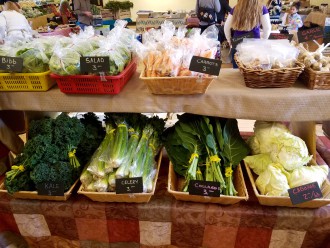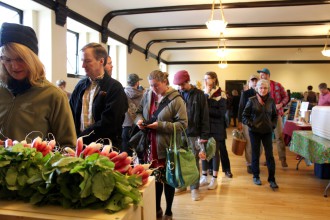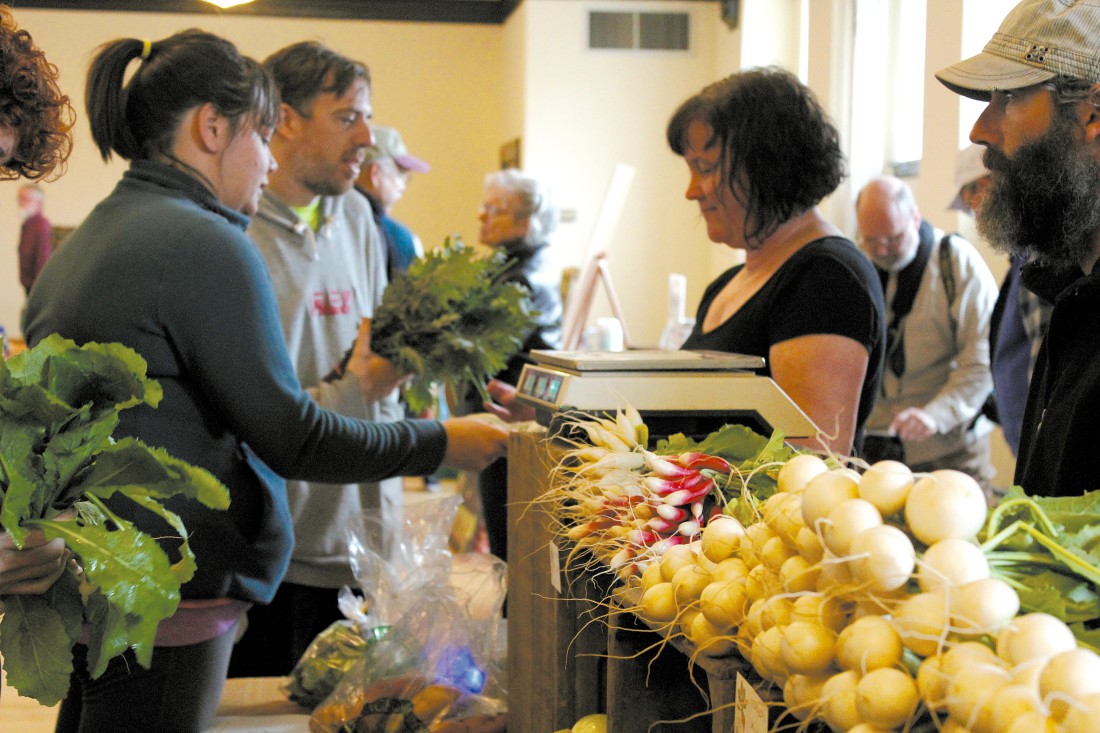On a bleak Saturday in mid-January, with clumps of dirty snow from a recent winter storm still hugging downtown sidewalks, there is little color visible against the gray sky outside the Asheville Masonic Temple. However, what’s peeking out of the shopping bags carried by a steady stream of people filing down the building’s steps is a different story — bright, leafy bundles of fresh greens, blushing apples and a rainbow of root vegetables.
January through March, the Appalachian Sustainable Agriculture Project hosts an indoor version of the Asheville City Market at the downtown venue on Saturday mornings. And despite less-than-balmy temperatures, both shoppers and vendors come out in force to trade in what is, during the frigid months, a coveted commodity: fresh, locally grown produce.
“Farmers are getting more and more savvy about growing through the winter,” says Molly Nicholie, program director for ASAP’s Local Food campaign. In addition to a selection of locally made baked goods, meats, cheeses, eggs and value-added food products, she says customers at Western North Carolina’s cold-weather markets can find a long list of fresh vegetables and fruit, including microgreens and sprouts, mushrooms, lettuce, collards, kale, winter squash, apples, carrots, potatoes and more.
Year-round revolution
Besides bringing some January joy to local-food devotees, the burgeoning winter market scene provides growers a platform from which to develop year-round farming strategies that can boost their business and benefit their customers. Since ASAP started keeping track of WNC’s local food venues in 2002, the number of winter markets in the area has gone from just one — the Henderson County Curb Market — in 2003 to nine this year, including three in Asheville and one in Black Mountain. Two of the three Asheville offerings are hosted by the YMCA.

The seed for the original YMCA Winter Market, which is held January through March outdoors in the parking lot of the Woodfin YMCA, was planted five years ago when a farmer complained to a YMCA staff member of a lack of venues for selling fresh produce in the offseason. Today, up to 20 vendors come out each week, many of whom specialize in winter produce, says YMCA Winter Markets manager Lisa Riggsbee.
The success of that venture led the organization to open a second winter market last year. It takes place Wednesday afternoons inside the lobby of the South Asheville Reuter facility. Vendor fees from both markets are used to support the YMCA’s nutrition outreach work, which includes 40 mobile units in five counties that bring veggies and other healthy edibles to food-insecure communities. The markets also serve to connect YMCA clients and the broader community — YMCA markets are open to all — with Asheville’s local food scene.
Although Riggsbee says she hasn’t noticed a significant increase in the number of produce vendors since the winter markets started, the ranks have held steady. And many of the original vendors from five years ago, including Wildwood Herbal, East Fork Farm and Hendersonville apple growers McConnell Farms, are still on board.
But notably, she says, the existing vendors seem to be getting much shrewder about offseason farming. “They’re really starting to figure out what people want and what people need during the winter months,” says Riggsbee. “The first couple years of the market, [customers] were willing to take anything and everything they could get their hands on because they weren’t used to having a winter farmers market. But now that they’re used to it, supply and demand comes into play, which is exciting.”
Cold cash
Wildwood Herbal’s Seth Salmon has been growing winter crops for six years on his Weaverville farm, specializing in “anything that will make it,” including spinach, collards, kale, onions, carrots, turnips and beets. In addition to vending his wares at the YMCA Winter Market North, he participates in the Asheville City Market at the Masonic Temple and operates a year-round community-supported agriculture program.
Salmon says he’s able to continue cranking out fresh veggies even through heavy snows and single-digit nights due to a combination of indoor and outdoor growing strategies and variety selection. His most popular items are spinach and collards. “Not lot of people grow collards,” he says. “But they are very winter-hardy, and through all that cold weather like we just experienced, they get so sweet and delicious.”

Although farms may have traditionally slowed down for a well-deserved rest between fall harvest and spring planting, Salmon observes that young farmers appear to have a different game plan. “It seems like the newer farmers on the local tailgate market scene are coming in with this expectation that they’re going to do winter crops, and they’ve already designed their systems for that,” he says.
Justin Aiello manages Olivette Farm north of Asheville, which just finished its second year of production. To serve customers at the local winter markets as well as the 10 or so restaurants he sells to, he grows a surprisingly wide array of diversified winter crops — everything from delicate baby salad greens and pea shoots to hardy radishes and turnips — using a combination of heated greenhouses and long, unheated hoop structures called caterpillar tunnels.
Before moving to Asheville, Aiello spent more than three years working some rented farmland outside Atlanta, where he says he “farmed casually during the winter,” marketing to a few restaurant accounts. But after getting to know WNC’s agricultural community, he realized he needed to step up his game.
“We really needed to find a niche because there are so many awesome farms around here in the main season that it can be hard to compete with them,” he says. He took a “leap of faith” last winter and built the caterpillar tunnels. “We planted a whole wide range of things just to see what would work. And by a mix of skill and luck, we had a very successful winter last year that helped us plan a lot better for this winter.”
Aiello looks at providing a steady supply of winter produce as a great way to enhance his business by maintaining an ongoing customer base throughout the year. Both his market regulars and restaurant clients appreciate this, he says.
But he acknowledges that winter growing is not going to be every farmer’s cup of tea. “There’s definitely an upfront cost to getting winter infrastructure, which can be prohibitive for some people,” he explains. “But I think a lot of farmers are learning that we have to diversify even more if we want to continue to be successful, because there is an abundance of farmers here, and there are even more showing up, so it’s only going to get more competitive.”
Salmon agrees that year-round growing gives his operation an edge. “The people who really place high value on naturally grown, fresh local food, they come out in the winter. And that group is getting larger and larger,” he says.
“To farm all year, then push it into the winter, that takes a lot,” he continues. “So that’s probably the single biggest thing for me, the big driving force for my farm: to know that that produce is going to be available for those people who have that understanding and desire for that product.”
For a list of Western North Carolina’s winter markets with schedule details, visit asapconnections.org and click on “Find Local Food.”




Before you comment
The comments section is here to provide a platform for civil dialogue on the issues we face together as a local community. Xpress is committed to offering this platform for all voices, but when the tone of the discussion gets nasty or strays off topic, we believe many people choose not to participate. Xpress editors are determined to moderate comments to ensure a constructive interchange is maintained. All comments judged not to be in keeping with the spirit of civil discourse will be removed and repeat violators will be banned. See here for our terms of service. Thank you for being part of this effort to promote respectful discussion.